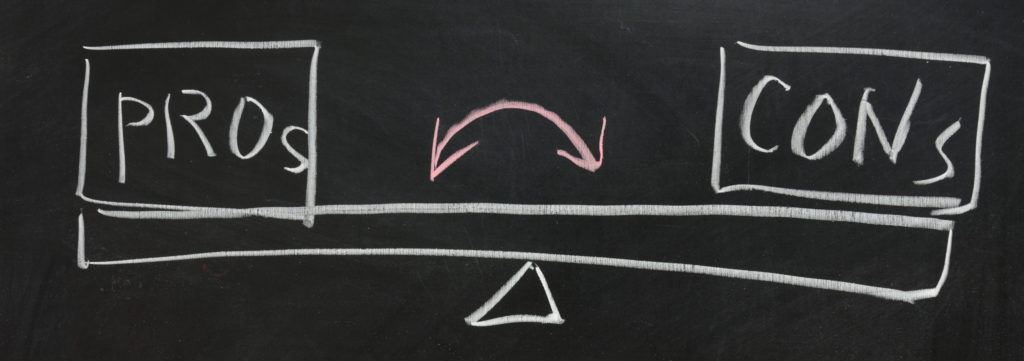What is a target date fund?
A target date fund is an investment that is designed to provide a reasonable risk/return trade off given the year you plan to begin withdrawing from the fund. It is a “fund of funds”, which means it is a mutual fund that owns other mutual funds.

The idea is that the fund will re-allocate the investments in the fund to become more conservative as your retirement date approaches. This means the further away the target date is, the higher potential growth, but also higher risk in the fund. The fund then slowly becomes more stable with lower growth potential as your date approaches. This is called the fund’s “glide path”. Essentially, you are paying a management fee for the fund to select how much to invest in other mutual funds based on how far away your retirement date is.
As an example, let’s look at a typical 2050 target date retirement fund:
- The investments in the fund will be allocated about 90% to stocks and 10% to bonds.
- As the year 2050 draws nearer, the fund will shift from 90% stocks to about 50% stocks and 50% bonds over the next 30 years.
- This serves to take more risk when you can afford to early on and automatically becomes more conservative as your retirement date draws nearer.
Due to increased popularity, it is likely that you have target date funds available in your 403b or 401k. Target date funds may even be the default your retirement goes into unless you select something different. With the increased popularity and availability of these investments you may be asking yourself: “Are target date retirement funds right for me?”

Target date funds may be a good fit for you if:
You are just starting to save for retirement. When your investing situation is simple and you only have one retirement account, target date funds can be a solid low cost option.
You have relatively small balances in your investment accounts. When this is the case, any added tax efficiency or other benefits of a more complex strategy probably aren’t worth the hassle yet.
Your only investments are in retirement accounts. If you haven’t saved much outside of retirement accounts yet and prefer the simplicity of a target date fund, they can be good low maintenance option. You don’t yet have to deal with managing your asset allocation over several accounts, with different tax implications and investments available in each.

Target date funds may not be a good fit for you if:
You might access the funds at a date other than the target date of the fund. The target date fund is invested assuming will begin withdrawing funds on the date stated in the fund. If you have a “2050” target date fund, and may need the funds sooner (or perhaps not until later) the fund may not be managed effectively for you.
For example, if you may pull funds out for a down payment on a house, or some other expense prior to retirement, a target date fund is not the best investment. If we see a downturn in the market and you need to access the funds, you’re going to be selling a highly depreciated asset at the worst possible time. The amount you take out won’t be given the time that it needs to properly recover. A comprehensive financial plan can account for funding these goals efficiently and invested accordingly.
Similarly, if you will be drawing from other sources of income in retirement prior to accessing your target date fund, you should not select a fund that matches your retirement date. Rather, a fund that matches your estimated beginning withdrawal date from the fund would be a better a choice. Which money to access, and when, is an important piece of your overall financial plan and should also take into account social security and taxes.
You have several accounts (401k, IRA, taxable account, old 401k, spouse 403b, etc.). It is unlikely you have access to the same target date fund in all the accounts. Since this is the case, you’ll need to begin creating an asset allocation strategy in at least one of the accounts. Once you have to do asset allocation in one account, you might as well do it in all accounts because it can be difficult to work around target date funds when managing your overall portfolio.
You have large balances. When you have large balances in your target date fund, it is at least worth exploring if you could save money by buying the underlying funds yourself. This will depend on the expense of your current fund.
To demonstrate why, let’s assume you have a target date fund with an expense of .55% annually. Let’s also assume you also have access to low cost index funds that you could buy for an average expense of .05% instead. This difference means little when your balance is small, but if you have $500,000 in the target date fund – picking the funds individually would save you $2500 annually. The savings increases the more you have in the fund, and is likely worth your time and effort once your retirement balances start reaching the six-figures.
You tend to be a worried investor. The target date fund won’t take into account your tolerance for risk. Ask yourself how you reacted when your investments were down in 2008. What about during the Pandemic in March 2020? If you sold or changed your strategy in either scenario, you would likely benefit from professional management that helps you stay the course during times of volatility. Your target date fund won’t pick up the phone and help you stick to an investment strategy when times are bad like a good investment advisor will.
You have taxable investment accounts. Target date funds are not efficient in taxable accounts (Typically, investment accounts titled as an individual, joint, or trust). When you have taxable accounts, it is more efficient to load your bonds in your retirement accounts and keep your stocks in your taxable accounts.
The reason is most bond interest is taxed as ordinary income, and target date funds hold taxable bonds (and can hold a lot of bonds if you’re close to your retirement date). If you must hold bonds in a taxable account and you’re in a high tax bracket, you want those bonds to be municipal bonds which are tax exempt and target date funds do not use municipal bonds due to their one-size-fits-all approach.
You need help beyond investment asset allocation and rebalancing. Retiring isn’t as simple as just saving into a target date fund and waiting for that date to roll around. You will need additional savings beyond social security, but how much? And when can you reasonably retire without running out of money? How much should you pay down debt verses save in the fund? These are questions a target date fund will not be able to help you with that can only be answered through careful analysis of your entire financial picture.
You prefer customization of your portfolio. With simplicity comes inflexibility. The advantage of a one-size-fits all approach can be a disadvantage if you don’t agree with any one part of the target date fund’s underlying investments.
For example, if you’re set on a socially responsible investing strategy, target date funds likely won’t work since they will require you to hold some investments that are counter to your investing beliefs. If you absolutely can’t stand a particular company or sector, there is no keeping it from being included in your fund.
Also, if you are picky about only using funds that are best in class, a target date fund is unlikely to be a good fit for you. For example, if you own a Fidelity target date fund, 100% of the underlying funds all happen to be Fidelity funds. If you own a Vanguard fund – 100% of the underlying funds are all Vanguard. Both are great companies – but Vanguard excels in some areas, and Fidelity in others. A customized investment strategy will allow you to use the best fund for each asset class.
Conclusion

Pros of target date funds:
- Simple way to implement a diversified portfolio
- The portfolio automatically adjusts risk for you based on the date selected
- Most target date funds have low costs and low minimums
- Widely accessible
Cons of target date funds:
- Will not take into account other investments in your portfolio
- Doesn’t take into account your risk tolerance
- Will not tell you how much you need to save to retire
- Will not help you stick to an investing strategy in a down market
- Are not tax efficient if you have any investments outside of retirement accounts
- Has a higher weighted expense than if you buy the underlying investments on your own
- Require an “all or nothing” approach
- Lack flexibility and customization
Target date funds are a great option for newer investors or those with simple investing needs. As your situation becomes more complex, with more accounts, larger balances, and more tax implications, it eventually becomes time to graduate to a more holistic strategy to account for those complexities.
Still not sure about your investment options? Schedule a complimentary consultation today to get your questions answered!




